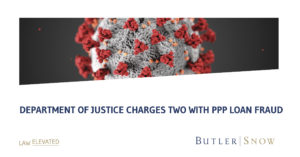On May 5, 2020, the U.S. Department of Justice (the “DOJ”) announced that it has charged two men with, among other crimes, providing false information as part of their Coronavirus Aid, Relief and Economic Security (“CARES”) Act-created Paycheck Protection Program (“PPP”) loan application package. This is the first time that the DOJ has announced criminal charges related to PPP loans.
According to its press release, the DOJ charged David A. Staveley, a/k/a Kurt D. Sanborn and David Butziger with “conspiring to seek [PPP loans], claiming to have dozens of employees earning wages at four different business entities when, in fact, there were no employees working for any of the businesses.” The related federal criminal complaint specifically charges Staveley and Butziger with conspiracy to make false statements to influence the Small Business Administration (“SBA”), the federal government agency ultimately administering the PPP, and conspiracy to commit bank fraud. The complaint additional charges Staveley with aggravated identity theft and Butziger with bank fraud.
According to the SBA PPP interim final rule and related FAQ, a financial institution making a PPP loan need only rely on the certifications submitted by a prospective borrower. Liability related to certification accuracy rests on the shoulders of the prospective borrower.
In its application, a prospective borrower must certify that: (1) The prospective borrower was in operation on February 15, 2020 and that it had employees to whom it paid salaries and for whom it paid payroll taxes or that it had independent contractors; (2) current economic uncertainty makes the loan requested necessary for the prospective borrower in order for it to support its ongoing operations and such assessment was made in good faith which requires, among other things, an analysis of the prospective borrower’s ability to access other sources of liquidity; (3) the loan proceeds will be used to retain workers and maintain payroll as well as continue making other permitted payments, so long as those permitted payments do not in total exceed 25 percent of the loan proceeds; (4) the prospective borrower will not receive another PPP loan between February 15, 2020 and December 31, 2020; (5) the material provided in the prospective borrowers application is “accurate in all material respects” and that the prospective borrower knows that a false statement is punishable under the law; and (6) lender institutions will use tax documents submitted by the prospective borrower to assess PPP eligibility and may share those tax documents with the SBA.
The administration asked that certain small businesses return PPP loan proceeds due to their ability to easily access capital markets by May 7, 2020, and it has asserted that it will audit any small business receiving a PPP loan of more than $2 million. This is the first time, however, that the administration, through the DOJ, has charged a prospective borrower with crimes related to a PPP loan application package, specifically challenging the veracity of prospective borrower certifications.
